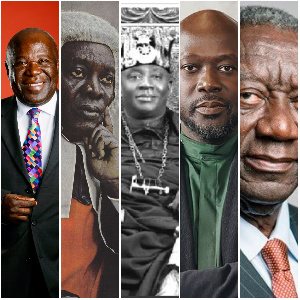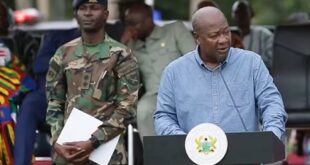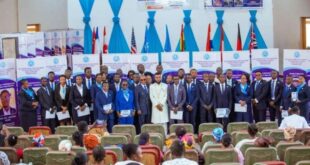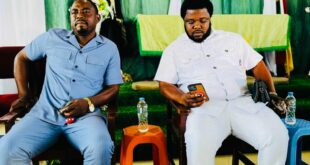“A knighthood, and the female equivalent, a damehood, is an award given by the queen (or king) to an individual for a major, long-term, contribution in any activity, usually at a national or international level.”
Across the world, there are several ways people who have contributed to the growth and advancement of society are recognised.
Awards, citations, memoirs, statues or even national days of celebrations are some of the examples of things that are done to show these people that their efforts are greatly appreciated.
In Britain, and while this is not only limited to Brits, the monarchy recognises the contributions of people to society through knighthood.
As the above quote explains, there continue to be many people who receive such honours and eventually take on the title of ‘Sir.’
The female equivalent of the knighthood is known as damehood and such honours go with the title Dame (Dame Commander of the Most Excellent Order of the British Empire, DBE).
In this GhanaWeb article, we take a look at three personalities who have been knighted by the British monarchy, taking on the enviable title of Sir.
Nana Sir Ofori Atta I, king of the Akyem:
(Profile made available via Wikipedia.com)
Nana Sir Ofori Atta I, KBE, Kt (born 11 October 1881 – 21 August 1943) was the Okyenhene or King of the Akyem people and of Akyem Abuakwa, a traditional kingdom that stretches back to the thirteenth century and was one of the most influential kingdoms of the then Gold Coast Colony. He ruled from his election in 1912 until his death in 1943.
Ofori Atta was educated in Basel Mission schools and at its Akuropon seminary, now named the Presbyterian College of Education, Akropong. He left the seminary after two years to work as a solicitor’s clerk, and then served in the West African Frontier Force, fighting during the Yaa Asantewaa War. Elected Omanhene of Akyem Abuakwa in 1912, he became a member of the Legislative Council in 1916.

In 1934, he led a Gold Coast Delegation to London to petition the British Parliament for official majority of Africans on the legislative council, permanent African representative on the Governor’s executive council and eligibility for non-chiefs to be provincial members of the executive council. He was also instrumental in setting up multiple schools, including Achimota School or College (formerly Prince of Wales School), where most colonial Gold Coast leaders and current prominent Ghanaian leaders schooled.
“Ofori Atta was the son of a senior official of the palace; his mother was the descendant of one of the founders of the kingdom…. Once in power, he was determined to return Akyem Abuakwa to its former glory.”
He created the Ofori-Atta dynasty by privileging education both amongst his sons and daughters, through two paths, “one firmly rooted in a concern for binding the state by the traditionally sanctioned method of multiple marriage and the other rooted in his strong case for ‘modernisation’ and ‘progress’.”
Family
He was the brother of Dr J. B. Danquah (a founding member of the United Gold Coast Convention). He was the father of Aaron Ofori-Atta, (the fourth Speaker of the Parliament of Ghana, a Minister of Communications and Minister of Local Government), Adeline Akufo-Addo, (First Lady under the Second Republic), William Ofori Atta (a Minister of Foreign Affairs, Presidential Candidate of the UNC), Dr Kwesi Amoako-Atta (Governor of Bank of Ghana and Minister for Finance and Economic Planning under the First Republic), Dr Jones Ofori Atta (Deputy Minister for Finance and Economic Planning under the Busia government), and Susan Ofori-Atta (the first female doctor in Ghana).

He was the grandfather of Nana Addo Dankwa Akufo-Addo, (current President of Ghana), Ken Ofori-Atta, (Ghana’s current Minister for Finance and Economic Planning and founder of the Databank Group), Osagyefuo Amoatia Ofori Panin (the Okyenhene, current King of Akyem Abuakwa), Samuel Atta Akyea (Minister of Works and Housing) and the writer Nana Oforiatta Ayim.
Sir Kobina Arku Korsah, former Chief Justice of Ghana:
In 1957, Sir Kobina Arku Korsah became the first African Chief Justice of Ghana.
Born on April 3, 1894, at Saltpond, Sir Kobina Korsah made history when he ascended to that high office of the judicial arm of government.
According to details on ghanaianmuseum.com, Sir Kobina Arku Korsah was the first Ghanaian alongside Nana Sir Ofori-Atta I to be appointed as a member of the Governor’s Executive Council.
He was the youngest person ever to be elected as a member of the Gold Coast Legislative Council and the first Boys Scout Commissioner in Ghana.

Sir Arku Korsah was the first Grand Master of the District Grand Lodge of Ghana, Scottish Constitution from 1953 to 1963.
After Sir Arku Korsah found the defendants in the Kulungugu bombing trial not guilty, Ghana’s first president, Osagyefo Dr, Kwame Nkrumah, removed him from office.
In addition to his judicial work, Sir Arku Korsah was also a founding member of the Ghana Academy for Arts & Sciences.
In August 1962, Sir Kobina Arku Korsah presided over the trial of five defendants. At the end of that trial, three of the accused were found not guilty and this displeased the Nkrumah government. Kwame Nkrumah sacked Sir Arku as Chief Justice in December 1963 unconstitutionally.
Sir Arku Korsah was Born in Saltpond and educated at Mfantsipim School, Fourah Bay College (BA degree in 1915), Durham University and London University (LLB in 1919).
He died on January 25, 1967.

Sir Sam Jonah, Businessman:
(Profile made available via otumfuofoundation.org.gh)
Sam Jonah’s career began in 1969 at the Obuasi gold-mine. He was appointed Chief Executive Officer of Ashanti Goldfields Company Limited in 1986 and over saw its growth from a one-mine operation into a multinational.
In 1996, Ashanti, which had listings in London and Ghana, became the first operating African company to be listed on the New York Stock Exchange.
He became Executive President of AngloGold Ashanti Ltd (world’s second largest gold producer) in May 2004 when Ashanti was merged with AngloGold Limited.
In 2003 Her Majesty, Queen Elizabeth II of Great Britain and Northern Ireland and Head of the Commonwealth, conferred on him an Honorary Knighthood as Knight Commander of the Civil Division of the Most Excellent Order of the British Empire (KBE).
In 2006 he was awarded Ghana’s highest national award, the Companion of the Order of the Star.
In December 2004, CNN and Time Magazine ranked him as one of the world’s top 25 most influential business people – setting the global standards for management, ethics, marketing and innovation. He is the recipient of five Lifetime Achievement awards, the most recent awarded in 2019 by the Albert Nelson Marquis.
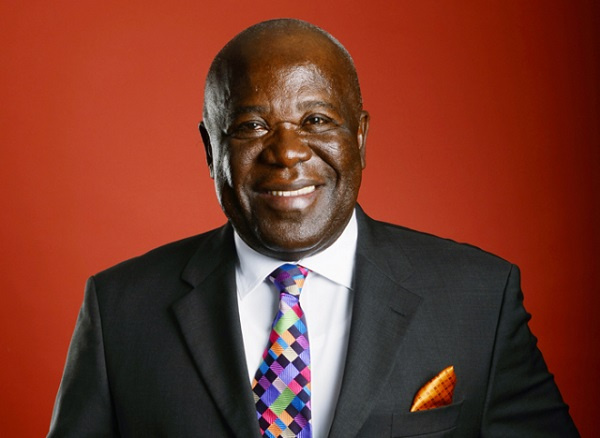
Sir Sam Jonah is the Chancellor of the University of Cape Coast Ghana, a former Member of the Board of Ashesi University in Ghana, a Visiting Professor of Business at The University of Witwatersrand Business School of Johannesburg and a member of its Governing Council as well as Trustee of the Nelson Mandela Legacy Trust (UK).
He was a Founding Member of the United Nations Secretary General’s Global Compact Advisory Council; a member of The African Regional Advisory Board of the London Business School, has served as a member of the Governing Body of the School of Oriental and African Studies and a Trustee of the Camborne School of Mines. In 2003, he was Co-Chairman of the World Economic Forum held in Durban, South Africa; he was on the Advisory Council of the President of the African Development Bank and the International Finance Corporation (IFC).
Sir Sam Jonah has served on the boards of several international public and private companies;
He previously served as Chairman of Equinox Limited (Australian and Canadian listed), Moto Gold Mines (Australian and Canadian listed), and Uramin (London and Canadian listed). He was previously Chairman of the Mauritius based Bayport Financial Services. He served on the board of Vodafone UK from 2009 up to July 2019.
Sam has been an Advisor to a number of African Heads of State, Thabo Mbeki (South Africa), Olusengu Obasanjo (Nigeria), Gnassingbe Eyadema (Togo) and John Agyekum Kuffour (Ghana). In December 2012, he was appointed a founding member of Bank of America Global Advisory Council and ended his term in March 2020.
He has also been elected as a Foreign Member of the United States National Academy of Sciences (Engineering Division) for the recognition of his distinguished contribution to engineering.
He was appointed as the Chairman of Helios Towers, UK in September 2019 and in January 2020, was appointed as Chairman of Roscan Gold Incorporation headquartered in Canada.
John Agyekum Kufuor, former President of Ghana
While he doesn’t use the title ‘Sir,’ the former president of Ghana, John Agyekum Kufuor, also makes it to this list.
In an earlier GhanaWeb story, John Kufuor shared the little-known story of how he was knighted by the former monarch of Britain, Queen Elizabeth II.
Recounting his most memorable moments with the late monarch, whom he encountered on several occasions, the former president explained that he had been invited to the United Kingdom by the Queen on a state visit.
In an interview monitored by GhanaWeb, he told the Ghana Broadcasting Corporation that while there, he met the Queen at a place where she had displayed gifts that she had received from Ghana.
President John Agyekum Kufuor explained that it was there that he got conferred with the honour of the Knight Commander of the Order of Bath of the UK by the Queen herself.
“She and her husband took me around to show me the gifts they had received from Ghana: some from former presidents, some from our chiefs; they had displayed everything there for me and my wife. Of course, we also sent some: I sent some necklace of precious beads from Ghana, a bit of gold and ancient beads.
“There, we showed them what we had sent them, and then after the exchange of gifts, she also showed me insignia – because they knighted me, gave me the Knight Commander of the Order of Bath; a very high post. It was honorary, of course,” he explained.

Profile of John Agyekum Kufuor
Mr. John Agyekum Kufuor was born on December 8, 1938, in Kumasi, Ghana. He had his Secondary Education at Prempeh College where he passed at the top of his class. He enrolled at Lincoln Inn, London, and was called to the Bar in 1961 at the age of 22. He then entered Oxford University where he passed his Honors BA degree in 1964 in economics, philosophy, and politics. He was subsequently confirmed, in accord with Oxford traditions, with the Master’s degree by the University.
Both sides of Kufuor’s parentage come from distinguished families whose members include chiefs, farmers, timber merchants, businessmen, university professors, doctors, engineers, accountants, teachers, nurses, lawyers, and politicians. J. A. Kufuor is happily married to Theresa (Nee Mensah). The marriage is blessed with five children, four of whom are university graduates with the youngest son still in the university. Mr. Kufuor and his family belong to the Roman Catholic Church.
Mr. Kufuor’s public service spans over 30 years. In 1967, he was appointed chief legal officer and town clerk (city manager) of Kumasi, the second largest city of Ghana. He was a member of the 1968-69 and the 1979 Constituent Assemblies that drafted the Constitutions of the Second and Third Republics respectively. In addition, he was a founding member of the Progress Party (PP) in 1969, the Popular Front Party (PFP) in 1979 and is a founding member of the New Patriotic Party (NPP). He has twice been elected as a member of Parliament, during the Second and Third Republics. He has also been in political detention on two occasions as a result of military coups that overthrew the Second and Third Republics. He has been a deputy minister of foreign affairs and in this capacity, he represented Ghana on several occasions. From 1969 to December 1971, he led Ghana’s delegation to the United Nations General Assembly in New York, the Organization of African Unity (OAU) Ministerial Meetings in Addis Ababa, and the Summit Conference of the Non-Aligned Movement in Lusaka, Zambia. In 1970, he led the Ghanaian delegation to Moscow in the former Soviet Union, Prague (Former Czechoslovakia), and Belgrade (Yugoslavia) to discuss Ghana’s indebtedness to these Countries.
As the spokesman on foreign affairs and deputy opposition leader of the Popular Front Party (PFP) Parliamentary Group during the Third Republic, he was invited to accompany President Limann to the Organization of African Unity (OAU) Summit Conference in Freetown, Sierra Leone. He was also a member of the Parliamentary Delegation that Visited the United States of America (USA) in 1981 to talk to the International Monetary Fund (IMF) and the World Bank on Ghana’s economic problems.
In January 1982, the leadership of the All People’s Party (APP), which was an alliance of all the opposition parties, advised some leading members, including the Deputy Leader of the Alliance, Alhaji Iddrisu Mahama, the General Secretary, Dr. Obed Asamoah, and Mr. J. A. Kufuor. To accept an invitation from the Provisional National Defence Council (PNDC) to serve in what was purported to be a National Government. Mr. Kufuor was appointed the Secretary for Local Government in this new Government. As a Secretary for Local Government, he authored the Local Government Policy Guidelines that were to be the foundation of the current decentralized District Assemblies. He, however, resigned within seven months of acceptance of the position after having satisfied himself that the PNDC Government was not the national Government that it promised to be. Indeed he found that it had a hidden agenda which he could not be a Party to. He also could not be a party to the intolerance, the brutality, abuse, and corruption of that Government.
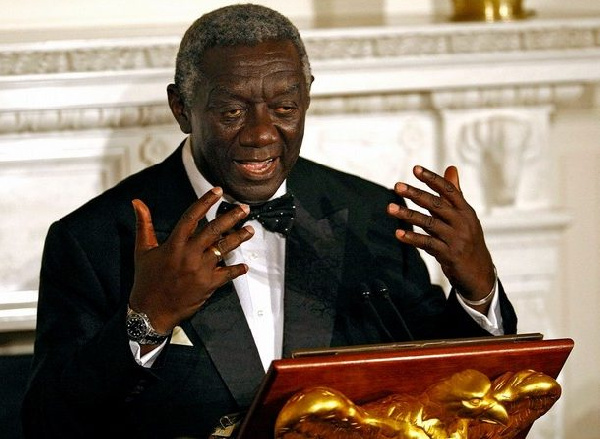
On April 20, 1996, Mr. J. A. Kufuor was nominated by 1034 out of 2000 delegates of the New Patriotic Party (NPP) drawn from all the 200 Constituencies of the Country to run for the President of Ghana on December 10, 1996. After campaigning for less than nine months, Mr. Kufuor polled almost 40% of the popular votes. On October 23, 1998, he was re-nominated by the New Patriotic Party not only to run again for President but to officially assume the position of Leader of the Party. Kufuor won the presidential elections in Dec. 2000 and was sworn in as president on January 9, 2001.
Sir David Adjaye, Award-Wining Architect:
(Profile made available via adjaye.com)
Sir David Adjaye OBE is an award-winning Ghanaian-British architect known to infuse his artistic sensibilities and ethos for community-driven projects. His ingenious use of materials, bespoke designs and visionary sensibilities have set him apart as one of the leading architects of his generation.
In 2000, David founded his own practice, Adjaye Associates, which today operates globally, with studios in Accra, London, and New York taking on projects that span the globe. The firm’s work ranges from private houses, bespoke furniture collections, product design, exhibitions, and temporary pavilions to major arts centers, civic buildings, and master plans. His largest project to date, The National Museum of African American History & Culture in Washington, DC opened on the National Mall in Washington DC in 2016 and was named Cultural Event of the Year by The New York Times.
In 2017, Adjaye was knighted by Queen Elizabeth II and was recognized as one of the 100 most influential people of the year by TIME Magazine. Most recently, Adjaye was announced the winner of the 2021 RIBA Royal Gold Medal. Approved personally by Her Majesty the Queen, the Royal Gold Medal is considered one of the highest honors in British architecture for significant contribution to the field internationally. Sir Adjaye is also the recipient of the World Economic Forum’s 27th Annual Crystal Award, which recognizes his “leadership in serving communities, cities and the environment.”

As a young boy born in 1966 in Dar es Salaam, Tanzania, Adjaye’s childhood saw stability in movement as his father Affram was a diplomat whose work took the family all over the world to places such as Kampala, Nairobi, Cairo, Beirut, Accra, and Jeddah. Adjaye was born into a vibrant era of hope where just previously Kwame Nkrumah had won the country independence from the British in 1957 and the spirit of emancipation was one that influenced the family’s mobilities. In his early adulthood, one of the many prolific projects that evolved out of David’s travels is the ‘Adjaye Africa Architecture: A Photographic Survey of Metropolitan Architecture’. The project took place over a ten year period documenting fifty-four major African cities and showcasing a concise urban history, fact file, maps and satellite imagery that come together in a rigorous analysis and reconceptualization of what African architecture is and can truly be.
A formative moment in Adjaye’s childhood was when he realized the inequities that his brother Emmanuel – who was partially paralyzed — faced when visiting his specialized school. Adjaye noted how inefficient, run-down and degrading the actual facility was. During his university education at South Bank he began to think about designing a facility that would provide better care for the handicapped, a moment he describes as changing everything. He came to the understanding that architecture should serve people and as a prevalent force within all our lives it too should take to the realm of egalitarianism.
Before going to graduate school, Adjaye spent a few months working in studios in London and later left for Portugal where he met and studied with the prolific Eduardo Souto de Moura. At the time, Portugal had yet to be fully integrated into the EU and still held with it an artisanal charm that had craftsmanship and self-sufficiency akin to one another in a collective enchantment. It was here that Adjaye fed his creative drive of architecture with Eduardo guiding and exposing him to the essence of materials as it pertained to time, touch and value.
He continued this creative strand in his travels to Japan where he found the works of Toyo Ito, Tadao Ando, Kenzo Tange and Yoshio Taniguchi as well as Japanese Buddhism courses at the University of Kyoto where he lived which allowed him to further explore thinking and considerations of architecture outside of the European cannon.
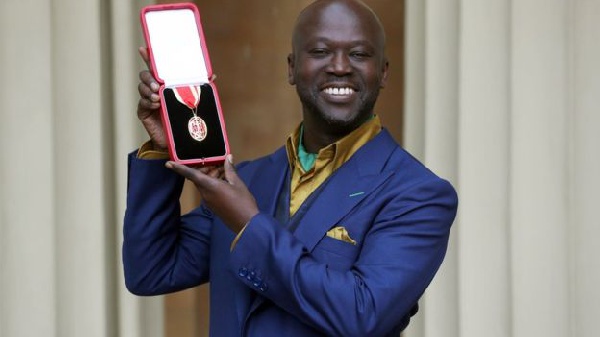
Adjaye then returned to London to establish his practice. His firm’s early work largely involved private commissions for the design of artist studios and residences and quickly evolved into civic commissions beginning with the Ideas Stores, two public libraries in London. The Ideas Stores, which became precedents for redefining the role of the library in fostering social interactions, led to larger-scale civic and cultural work such as Adjaye’s first project in the US, the Museum of Contemporary Art Denver which was completed in 2007. Nearly a year after its opening, Adjaye was commissioned to design the Smithsonian National Museum of African American History and Culture. Today the portfolio continues to evolve with major cultural and civic projects.
Ultimately, for Adjaye, architecture is “a social act” — it’s about constructing buildings that acknowledge and understand their histories, whilst creating something entirely new, in order to serve communities into their futures.
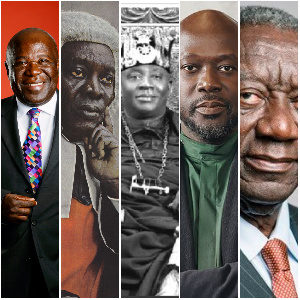
Otumfoɔ Osei Agyeman Prempeh II
The British Government restored the Asante Confederacy on January 31, 1935, with Otumfoɔ Osei Agyeman Prempeh II as the Asantehene.
In 1947 the British government conferred on him the knighthood of the Commander of the British Empire (KBE).
He spearheaded the establishment of the National House of Chiefs and sited its
headquarters in Kumasi.
He was the second literate and Christian king and he saw to it that education became the cornerstone of his nation‟s development.
 Home Of Ghana News Ghana News, Entertainment And More
Home Of Ghana News Ghana News, Entertainment And More
